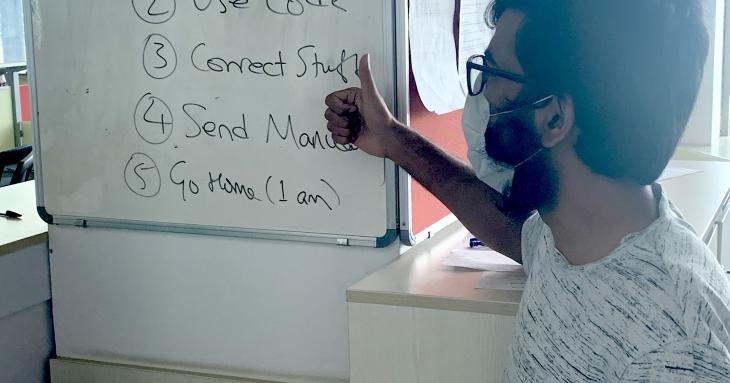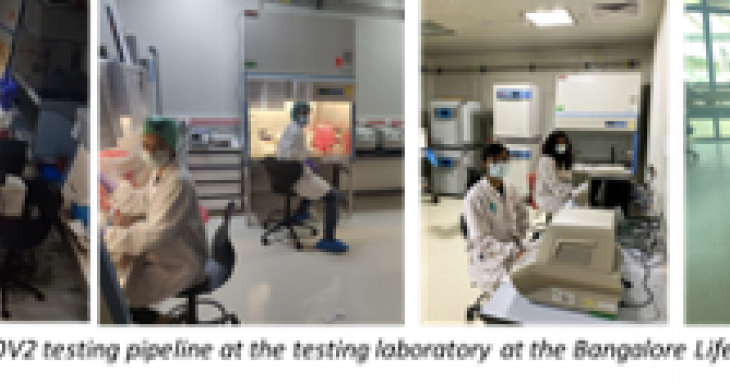We all remember the early days when the news of the COVID-19 pandemic was being discussed over chai. Months have passed since the pandemic has turned into a worldwide crisis bringing daily routines to a grinding and extended halt. In a country that numbers over a billion, the second most populated nation of the world, India was standing at a precipice, staring down at an unimaginable healthcare crisis fearing morbidity and mortality. Then came the lockdown and the slow ticking of the numbers on the ever-climbing graph of COVID-19 cases. We stare at this graph for tell-tale signs of flattening and hoping for a miracle to help win this battle against the invisible enemy. Undoubtedly, the miracle we are talking about is rooted in scientific thoughts, discovery, and innovations. Today, it’s the zeal and tenacity of the scientific community that we are counting upon to fight the disease and find a cure. A virus that multiplies unnoticed, spreading from one asymptomatic carrier to another, has turned out to be a formidable enemy. Epidemiologists knew that testing people in large numbers for the presence of infection and not just those who are sick and suspected, can be the only way to stay ahead of the path of destruction taken by the SARS-CoV-2 virus. In fact testing populations has emerged as the cornerstone in the management of epidemics in most parts of the world and the COVID-19 pandemic is no different. Early testing is key to identifying active carriers of the virus and their contacts thereby controlling the spread of the disease as well as identify patients to be provided with early care.
"Given the need of the hour, as a campus we felt that since we had the resources and training for creating a laboratory for testing for the virus, we should offer to test patient samples for the presence of the virus using RT-PCR. Little did we realize how different running a diagnostic facility is from research and it's been a huge learning experience for so many. But we felt that we must engage in this endeavour to provide testing for the State of Karnataka. The whole activity is voluntary and the campus is very proud of our army of COVID testers.”
- Satyajit Mayor, Director NCBS
In order to tackle this pandemic, research organizations worldwide are working at different levels to contribute towards the management of COVID-19. Recognising the need for aggressive testing in India’s battle against COVID-19, in the early part of April, inStem and NCBS brought their resources, community and facilities together to set up a testing laboratory. This was bolstered by the support of the Secretaries of the Department of Biotechnology (DBT), the Department of Atomic Energy (DAE) and the Indian Council of Medical Research (ICMR), and the guidance of our supportive but ever-alert biosafety and human ethics regulatory committees. Within less than a week of receiving the go-ahead, the laboratory began its operations in a dedicated space with teams of volunteers working closely with members of our faculty, Colin Jamora and Dasaradhi Palakodeti from inStem; and Raghu Padinjat, Uma Ramakrishnan and Varadharajan Sundaramurthy from NCBS. “With the expertise of some of the best research minds, top-notch research facilities and laboratories inside the campus, the best that could have been offered at this point of time was helping in rapid and efficient testing, and further research in finding new ways to detect the virus and limits its effects,” recalls Colin Jamora.
“The testing effort on campus is rooted in our community’s commitment to respond to national need.”
- Apurva Sarin, Director, inStem
The testing laboratory not only meets the highest standards for safety and ethical management of information, but the overall well-being of the volunteer team was seen as being equal, if not more important. Establishing a ‘Peer Connect Line’ in the campus in response to the lockdown was a natural way to connect testing centre volunteers to each other and have someone to respond and help, if needed. This is essentially a peer-to-peer support network for student and postdoctoral fellows on campus, staffed by student volunteers supporting this initiative following orientation by various people including mental health professionals. Armed with scientific know-how, technical expertise, state-of-the-art equipment, and a dedicated team of medically certified volunteers, we set on the herculean task of sample testing.
"The rhythm and tenor of work at the testing facility is very different from research. And yet our community came together, bringing together their varied strengths. This spirit and effort allowed us to successfully test over 10,000 samples. I hope we will be able to continue with the same enthusiasm,”
- Uma Ramakrishnan, NCBS
The testing laboratory is performing PCR based tests which essentially checks for the presence of the viral RNA from patient samples in a quantitative manner. Therefore this test is considered highly sensitive and can be used to identify infected individuals. No patients come to the campus. The typical procedure includes sorting, labelling, and aliquoting samples (collected in hospitals and clinics in Bengaluru and districts of Karnataka) by a group trained to work in a restricted area equipped with biosafety cabinets fitted with burnout units and 100% air exhaustion. A typical day will see a volunteer in this group spending 5-6 hours continuously covered in protective gear from head to toe that looks like a spacesuit! Only inactivated (non-infectious) material leaves this area to be processed by the RNA extraction team that churns out batches of samples per hour, passing these to the RT-PCR group, which completes the final steps of the process. However, this by no means is the end of the testing protocol. The final step involves careful documentation and reporting of results to the local hospitals that decide the further course of action based on these test results, as well as to district, state, and national authorities who use this data to track the prevalence and spread of this disease. Though the procedure sounds simple, nearly ~80 volunteers are working in close coordination across shifts to complete this task!
The level of commitment, dedication, and support from the campus community has been outstanding in the weeks since the actual work started. Volunteers from across the board on campus, have stepped in to create this testing centre that runs every day, which typically starts at 8AM and ends past midnight! The ‘frontline’ team has been working relentlessly without a break since April 13, 2020 – the first day when on-campus COVID-19 testing started. “With the demands for testing increasing, we look forward to the continued support from our community. This indeed is an incredible opportunity to respond to a need 'in real time,” says Varadharajan Sundaramurthy, and as one of the student volunteer puts it, 'an experience that will stay with us’.
In the first week, nearly 200 samples/day were tested, which over time has multiplied by almost three times. May 29, 2020 is a memorable day for everyone who has volunteered for this effort as the testing number crossed 10,000. The laboratory is currently contributing to 10% of Karnataka’s testing effort. Testing data will help us to develop a more complete picture of the spread of the disease on local and regional levels, and predict better the course of the disease. This data will also provide important insights for public health officials and governing bodies in stopping or slowing disease spread. Testing is key to mitigation efforts, helping investigators characterize the prevalence and spread of the disease.
As cases surge across the globe, scientists from institutes such as ours, are mobilizing in a united effort to confront, delay, and stop its spread in various ways. These include faster and effective testing, designing cost-effective medical equipment, and working on vaccines in collaboration with government and pharma companies. Thousands of patients have already recovered from COVID-19 in the past few months, but there’s a long way to go as a community, before we win this battle.
Stay tuned to know more about our efforts against COVID-19.











0 Comments